| |
|
|
Allama Muhammad Iqbal
Conference
(Session 4: Present Global Scenario and Vision of Iqbal)
Organised By
MUSLIM Institute
|
|






|
|
MUSLIM Institute organized “Allama Muhammad Iqbal Conference” on Thursday November 8, 2018 at National Library, Islamabad. The conference was comprised of four sessions and a Cultural Musical Evening on Kalam-e-Iqbal. Fourth Session “Present Global Scenario and Vision of Iqbal”, was chaired by AVM (Retd.) Faaiz Amir (Vice Chancellor, Air University, Islamabad). Prof. Jalil Aali (Writer, Poet & Columnist) and Prof. Dr. Izharullah Izhar (Chairman, Dept. of Urdu, Islamia College Peshawar) shared their views on the occasion. Sahibzada Sultan Ahmad Ali (Chairman MUSLIM Institute) presented vote of thanks. Mr. Azizullah Shah Advocate (Research Associate, MUSLIM Institute) moderated the proceedings of the session. Researchers, scholars, students, university professors, lawyers, journalists, social activists and people from different walks of life participated in the conference.
|
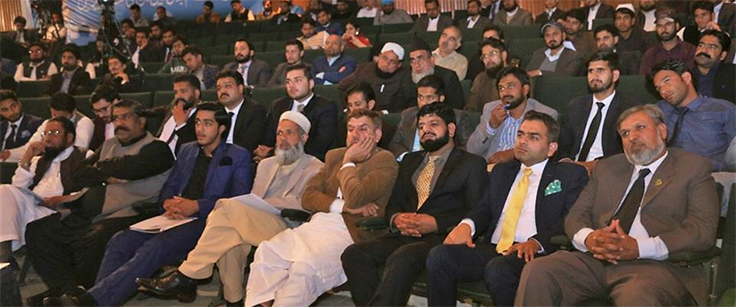
Participant view during the fourth session of conference.
|
|
Brief Summary of the remarks shared by speakers in second session is as under:
|
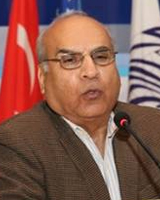
|
Iqbal’s Concept of Nationalism and Nation State
Prof. Jalil Aali
Writer, Poet & Columnist
|
|
As far as nationalism is concerned, it is a peculiar kind of unification which makes a nation distinct from other nationalities. But Iqbal’s concept of nationalism and nation state differ from their prevalent concepts which is the product of Hindu Muslim tensions in the subcontinent. These tensions take their origin with the ideological resistance of Mujadid Alif Sani and Sheikh Ahmad Sirhindi against Akbar’s “Deen e Elahi”. This movement was based on the notion that Muslim Ummah manifests its peculiar identity. Muslims cannot merge their civilizational and social identity into any other nationality in any case. Muslims of the subcontinent faced another challenge to their civilizational identity when centuries old kinship system fell a prey to crisis. Following the colonial period, decision making powers were diverted towards numerical strength. While seeking the solution to these challenges, Iqbal inclined towards the universality of Islam. Iqbal realised that Muslim Ummah cannot be understood like western nations.
International turmoil and Hindu Muslim tensions in the subcontinent led Iqbal towards the reconstruction of the concept of nationalism. Otherwise, under the prevalent concept of nationalism, All India Congress tried its level best to exploit Urdu and ensure the supremacy of Hindi. Credit goes to Allama Iqbal, who, by dint of his universal wisdom sowed the seed of two nation theory in the subcontinent. He educated the masses regarding the presence of two separate and distinct identities in the subcontinent who are distinct in culture, language and history.
|
|
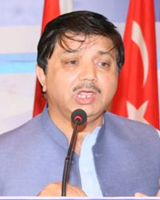
|
Iqbal’s Political Thoughts and Current Political Theories and Systems
Prof. Dr. Izharullah Izhar
Chairman, Dept. of Urdu, Islamia College Peshawar
|
|
Universally, Iqbal is considered a symbol of change. He surfaced in the era of chaos and disorder. He observed as well as absorbed the rise and fall of contemporary movements of literature and politics and appeared as a sage and a philosopher. Iqbal was full of curiosity. He kept on observing and analysing the universe. After voyage to Europe, his assessment of international politics transformed his thinking. So, he strived to elevate the humanity in this world. In ‘The Devil’s Conference’ and other writings, he kept on criticizing the world politics. For the Western democracy Iqbal says it is a certain form of government in which men are counted but not weighed.
According to Iqbal, international system is designed to benefit a specific set of persons. He couldn’t bear the disgrace of humanity internationally. As a Muslim, he studied and thought upon human history and pointed out the shortcomings of international political system. Initially he was of the view:
Close the hour approaches of the kingdom of the poor—
Every imprint of the past find and annihilate!
However, later he found that all the prevalent ideologies of his time were leading towards the same point and safeguarding interests of only a certain faction. There is no ideology present to uphold the sanctity of humanity. He expresses in ‘The Devil’s Conference’:
How could I be frightened by these Socialists, straying about the streets?
Wretched and straitened, distracted in mind, incoherent in speech
|
|
|
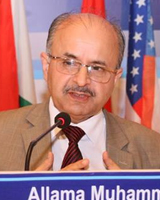
|
(Remarks by the Chair)
Contemporary World and the Philosophy of Iqbal
AVM Faaiz Amir (Retd)
Vice Chancellor, Air University, Islamabad
|
|
It is inevitable to understand the period of Iqbal or any other poet in order to have a better understanding of his poetry. Iqbal was born in 1877. It was 21 years before his birth that Muslims lost war of independence. He spent his childhood with the memories of 1856 when Muslims of the sub-continent were facing decay. In the years of 1890 and 1896, great game was going on between Russia and Britain followed by the war of 1914. Iqbal went through these tumultuous events. One can see gradual development in his works with the passage of time. In the beginning he wrote Shikwa & Jawab-e-Shikwa and in the end we can see the mentioning of Trablus Mosque in his poetry. At that time, he considers Afghanistan, centre of gravity. In his poetry, he clearly emphasized that the peace of Asia is directly dependent over the peace in Afghanistan.
In connection with nationalism, Iqbal said:
Unto a nation faith is life, You lost your faith and fell,
When gravitation fails, must cease concourse celestial.
Although Iqbal wrote a few poems in connection with nationalism. But later he wrote ‘Reconstruction of Religious thoughts in Islam’ and I want to quote here some text.
“For the present every Muslim nation must sink into her own deeper self, temporarily focus her vision on herself alone, until all are strong and powerful to form a living family of republics……. It seems to me that God is slowly bringing home to us the truth that Islam is neither Nationalism nor imperialism but a League of Nations which recognizes artificial boundaries and racial distinctions for facility of reference only and not for restricting the social horizon of its members”.
|
|
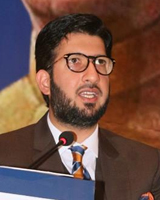
|
Vote of Thanks
Sahibzada Sultan Ahmad Ali
Chairman, MUSLIM Institute
|
|
I am grateful to all the august participants who joined us in first, second, third and fourth academic sessions. I am also thankful to the presenters of Kalam-e-Iqbal, recitation of Holy Quran and the those who participated in question answer session and ensured their presence since morning. All of you, in fact, made the conference successful. I am also thankful to the MUSLIM Institute team for putting their efforts. One thing I would like to highlight in the end that our universities and other institutions should put their due efforts in disseminating the message of Iqbal. Your attention is highly appreciated.
|
|
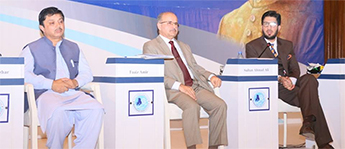
Stage view in fourth session of conference.
|
|
|
|
Cultural Musical Evening on Kalam-e-Iqbal
|
|
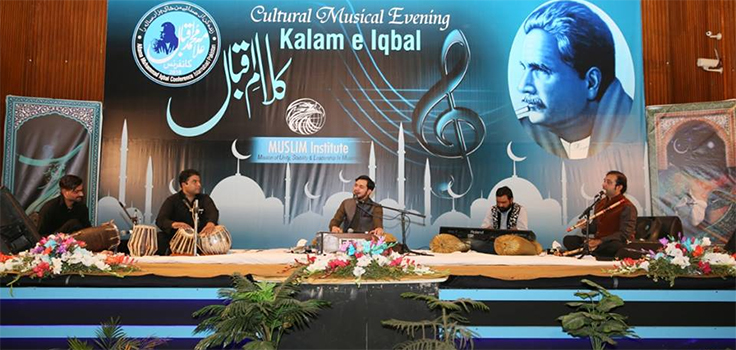
Stage view in musical session of conference.
|
|
After four academic sessions of the conference, a ‘Cultural Musical Evening on Kalam-e-Iqbal’ was also organized. In this Cultural & Musical Evening, Raja Hamid Ali presented Kalam-e-Iqbal. Engineer Rafaqat H Malik (Research Associate, MUSLIM Institute) moderated the proceedings of this session. Researchers, scholars, students, university professors, lawyers, journalists, social activists and people from different walks of life participated in the event.
|
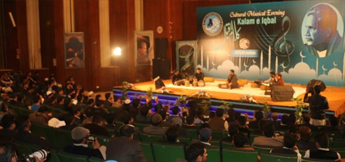
Stage and hall view in musical session of conference.
|
|
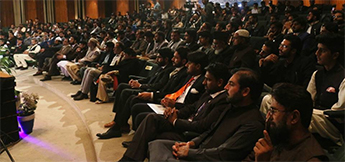
Participants view in musical session of conference.
|
|
|
| |
|
|
|
|
|
| |
|